 |
 |
 |
 |
 |
 |
|
|
||||
|
New
words of the month
MED Profile |
Contributors |
|||
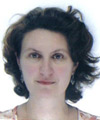 |
Sinda Lopez was born in Oxfordshire, UK of Spanish parents. She has lived in both in England and Spain and is bilingual in both languages. Shortly after graduating from Cambridge University with a degree in French and Spanish, she began her lexicographic career in 1987 working on the Oxford Spanish Dictionary. Over the years, she has been Managing Editor of Bilingual Dictionaries at Longman and Routledge and decided to go freelance in 1999, prior to the birth of her second child. As a freelance lexicographer she has worked on a wide range of both monolingual and bilingual projects for various publishers including Oxford University Press, Longman, Larousse, Bloomsbury and Macmillan. In the last five years, she has focused mainly on project management of dictionaries which have included several Larousse titles and recently the Macmillan Diccionario Pocket.
|
|||
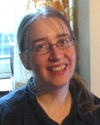 |
I first became interested in learner's dictionaries more than 10 years ago while teaching English in Lithuania. I became a lexicographer with Cambridge University Press in 1999 and since then I have been involved in several ELT publications including Cambridge Advanced Learner's Dictionary, Cambridge Learner's Dictionary, the CD-ROM versions of the Macmillan English Dictionary and Macmillan Essential Dictionary as well as the Macmillan School Dictionary website. I have contributed to several websites – writing articles, designing web pages as well as adapting and creating interactive activities and games. I work from my home in Perthshire and most of my spare time is taken up with my baby sons Aonghas (Gaelic for 'Angus') and Duncan, and walking my parents' border collie, Misty.
|
|||
 |
Kerry has a first degree in computational linguistics and an MA in theoretical linguistics from the University of Manchester, specialising in syntactic theory. For several years she worked as a researcher at Manchester and Essex universities, where in connection with European projects on machine translation, she was involved in computational lexicography, co-ordinating research in computational descriptions of compounds and collocations, and presenting her work in various international academic contexts. In 1993 she joined Cambridge University Press as a lexicographer/editor and grammar consultant, and worked on a large number of Cambridge learner's dictionaries, including the English Pronouncing Dictionary, the Cambridge International Dictionary of Phrasal Verbs and the Cambridge Learner's Dictionary in print and CD-ROM versions. In June 2001 Kerry moved to York where she now works as a freelance editor/lexicographer and is involved in a range of dictionary and grammar projects. Among the publications she has contributed to are Advanced Grammar In Use (2nd Ed.) and the Cambridge Advanced Learner's Dictionary for Cambridge University Press, the Collins COBUILD Elementary Grammar (2nd Ed.), Macmillan Phrasal Verbs Plus and the Macmillan School Dictionary. As well as being the regular author of the MED website's 'Word of the Week' column, she regularly writes for MED Magazine and co-authors grammar reference material for onestopenglish. Most of her spare time is spent looking after her two young sons Tom and Sam, though she enjoys walking, swimming and any opportunity to travel.
|
|||
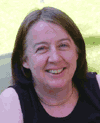 |
Like most people who write dictionaries for a living, I became a lexicographer by chance. After taking two degrees in Italian at Edinburgh University I spent a decade working in Italy and the UK as an ELT teacher and course organiser, and as a teacher and translator of Italian. I was looking for a change when a friend spotted a job ad for a bilingual lexicographer; I applied and got the job. Like most people I had never thought of lexicography as a possible career and had only the haziest idea of what lexicographers actually did, but I’ve been doing it ever since. I worked full time for a couple of dictionary publishers before turning freelance in 1999. Since then, as well as writing and editing a wide range of monolingual and bilingual dictionaries, I have continued to work as a translator from Italian. For several years I wrote a weekly article on English language and usage that was published on the Internet. The most enjoyable aspect of that job was contact with the readers, both language learners and language experts, whose queries and comments were endlessly stimulating. For Macmillan I have worked as a compiler and editor on both editions of the Macmillan English Dictionary (MED), as well as the Macmillan Essential Dictionary and the Macmillan Diccionario Pocket. I also wrote some of the study pages for the Essential and the second edition of MED, and wrote some of the practice exercises on the new MED CD-ROM. For MED Magazine I answer queries from readers and write occasional reviews of books on language. When I have time to spare from work and family life (I have two children, one a student at university, one still at school), I am very keen on gardening. As well as a fair-sized garden at home I have an allotment where I grow many different kinds of fruit and vegetables. I also sing in a choir that is based at the university here in Birmingham. Twice a year we get to sing in the city’s magnificent Symphony Hall, which is always a thrill.
|
|||
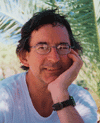 |
I have been a lexicographer since 1980, following a short and not very brilliant career as an academic, then as an English language teacher. Although I got into the dictionary field completely by accident, I've been lucky enough to be involved in all the major developments over the last 20 years or so. I worked for a time at COBUILD during the earliest days of corpus lexicography, then for over ten years at Longman, and most recently I have been dividing my time between Macmillan's exciting dictionary publishing programme and my own business as a trainer and project manager. As Managing Editor at Longman Dictionaries (1984-1994), I was responsible for several big dictionary projects, including the Longman Dictionary of Contemporary English (1987 and 1995 editions), and the Longman Language Activator (1993). Since 1998, I have been a lexicographic consultant for Bloomsbury Publishing Plc, who planned and wrote the Macmillan English Dictionary for Macmillan. As well as designing, editing, and project-managing dictionaries, I've been very involved in the design and collection of several major corpora, including the Longman Learner Corpus (the first of its type, which we started developing in the late 1980s), and the British National Corpus. I've also worked with computer scientists and software engineers in the creation of computational tools for analyzing the data in corpora, most recently the "Word Sketch Engine", a state-of-the-art corpus query system developed by my colleague Adam Kilgarriff. Over the past 15 years or so, I have trained dozens of lexicographers, and also done quite a lot of university teaching in this field. Throughout the 1990s, I taught on lexicography courses at the University of Exeter, and in 2002-2003 taught on the MSc programme in Lexical Computing and Lexicography at the University of Brighton. For the past five years, I have been working with Sue Atkins (probably the world's leading bilingual lexicographer) and Adam Kilgarriff (a brilliant computational linguist, who supplied the "Word Sketches" used in the writing of MED) in our own company, Lexicography MasterClass Ltd (LexMC). LexMC has run training workshops in lexicography and lexical computing (in venues such as South Africa, Denmark, China, Japan, and the UK), provides a corpus-development service, and manages dictionary projects for other institutions. Our annual Lexicom workshop is now in its fifth year, and our most recent venture was managing a major new project (funded by the Irish government) to produce a new, corpus-based English-Irish dictionary. I have written numerous papers on corpus-based pedagogical lexicography, and I also wrote a regular column for about three years on aspects of corpora in language learning for the Pilgrims' "webzine" Humanizing Language Teaching. Apart from writing dictionaries, I train regularly in T'ai Chi, I'm trying to learn Spanish and (to a more limited extent) Japanese, and I am active in local politics (as a member of an environmental group opposing inappropriate development in Canterbury, where I live). I also like movies and watching (but not playing) cricket, and wrote The Dictionary of Cricket (OUP) in 1995. My wife Maggy is a writer and editor, and her most recent book is the 3rd edition of the Palgrave Macmillan Dictionary of Women's Biography. Our son Raphael is 25 and works in London for Accidental Records – a small record company owned by the musician Matthew Herbert – as well as moonlighting as a DJ under the name Raf Daddy. Our daughter Jess is 20, and doing a degree in Classics at Leeds. Dictionaries have improved enormously in the last 25 years, but I'm convinced there is still plenty of scope for making them even better – and this is why working with dictionaries is always so interesting and challenging. As the father of modern computing, Alan Turing, once said: "We can only see a short distance ahead, but we can see plenty there that needs to be done."
|
|||
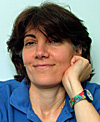 |
Having studied the foundations of graphic design in college, I call myself a graphic designer first and foremost. Yet I have skills in many area of computing, the Internet, design, usability and troubleshooting. Eight years ago, whilst working for the Macmillan IT department, I began integrating web interface design into my skills set. I work as a freelance print and web designer from Manchester. While running my own freelance studio, I have consulted and worked for educational publishers, non-profit organizations, large companies to small start-ups. Born and raised in Kenya, of Greek parents, I must have inherited a passion for travelling, which at the same time also gives me the chance to do my other passion, photography. I prefer to spend my free time outside gardening, walking, cycling or swimming.
| |||
| Meet the Editor | ||||
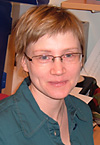 |
Kati
Sule I come from Hungary. I studied English Language and Literature at the University of Szeged in south-east Hungary where I also completed an English Language Teaching degree. I taught English in Hungary and briefly in the Netherlands. I work as Commissioning Editor in the Macmillan Dictionaries editorial group and I am also one of the editors of the Macmillan English Dictionaries resource site. I am based in Amsterdam but frequently travel to the UK. I'm a keen but rather lazy runner. In my free time I enjoy squash, films, books and the company of our 13 year-old cat called Cica. |
|||
| Cover photographs
courtesy of DigitalStock/Corbis (Language Interference) and STOCKBYTE
(New word of the month) |
||||
| |
||||